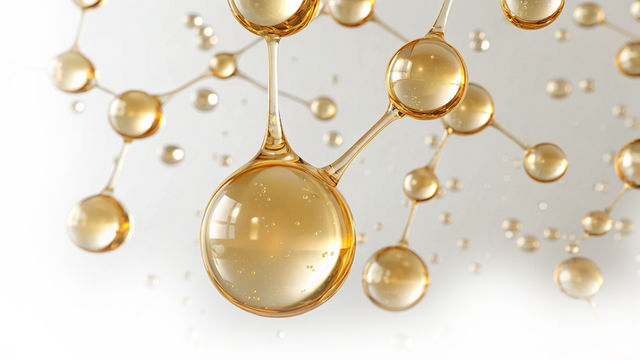
Panel discussion on...
Peptides
Cutting-Edge Innovations in Peptide Technology: Transforming Skincare Science
Peptides have long been recognized as powerful bioactive compounds in skincare, and recent advancements are expanding their potential even further.
At Lucas Meyer Cosmetics by Clariant, we have identified two significant advancements in peptide technology that we consider complementary, to offer a broad solution for the cosmetic industry. The first axis is the developments of active ingredients based on cyclic peptides that are naturally present in plants, algae, fungus or bacterial world, but whose concentration on the product can be optimized during the extraction processes.
This allows the production of peptides that combine natural origin with efficacy. Indeed, natural cyclic peptides offer enhanced bioactivity, improved stability, and superior cellular penetration compared to their linear counterparts (1). Their unique circular structure makes them more resistant to enzymatic degradation, allowing for long-lasting efficacy. When the extraction process is optimized to increase the concentration in the final extract, these peptides provide a natural alternative to synthetic molecules, combining stability with effectiveness. Research has shown that some cyclic peptides can activate the retinoid pathway in a manner similar to retinol while avoiding irritation (2), making them suitable for sensitive skin.
The second key area of advancement in peptide development is the improvement of synthetic synthesis processes, particularly through the adoption of new manufacturing methods aligned with the 12 principles of green chemistry. A significant breakthrough in this field is the shift toward PFAS-free peptide production, particularly by enhancing Solid-Phase Peptide Synthesis (SPPS) and Liquid-Phase Peptide Synthesis (LPPS) processes. The challenge lies in optimizing these innovative protocols without compromising the quality of the peptides, ensuring large-scale production while maintaining high purity levels (90-95%). This approach meets the growing demand from consumers for effective peptides at low dosages, as seen in traditional synthetic biomimetic peptides, while enabling brands to confidently market their products as PFAS-free.
Peptides in the Competitive Anti-Aging Market
The anti-aging market is saturated with active ingredients, yet peptides continue to differentiate themselves due to their targeted mechanisms of action, even at low dosage. Their ability to support specific biological processes allows them to complement or serve as an alternative to certain cosmetic procedures. Furthermore, due to their high level of purity, peptides are well-tolerated across different skin types, including sensitive skin, making them a versatile option for various formulations.
Peptides also play a role in pre-aging skincare, targeting individuals seeking to maintain skin health and delay visible aging. Their ability to regulate various skin functions proactively ensures that they cater to both corrective and preventive skincare needs. For example, new biomimetic peptide targeting the stratum corneum layer by improving the strengthening of the corneocyte envelop, allow to efficiently reinforce the barrier function, preserving the skin from premature aging. Recent studies utilizing AI-driven trials have demonstrated their potential in reducing the visible signs of aging, marking an advancement in skincare research (3).
Beyond Anti-Aging: The Expanding Role of Peptides
With the rise of the skinification trend—where skincare principles are being applied to other beauty categories—peptides are finding new applications beyond traditional anti-aging care. In haircare, peptides can support scalp health, promote hair length or/and improve hair fibers. Certain peptide combinations have been shown to contribute to a healthier scalp environment to prevent hair length (4). Other have demonstrated a capacity to stimulate melanin production, for an anti-greying hair effect. These new developments offer new avenues for research in haircare solutions.
Trends Driving Peptide Skincare Development
Several key trends are driving the evolution of peptide-based skincare. Sustainability is a major concern, prompting manufacturers to develop peptides with higher levels of naturality through green biochemistry and plant-based sourcing. As skin sensitivity becomes an increasing issue, peptides also offer a gentler alternative to traditional actives that can sometimes cause irritation. Additionally, consumer interest in high-efficacy skincare has fueled the demand for peptides. Notably, since late 2022, Google Trends data has shown a nearly 60% increase in searches for "peptides" in the U.S., with associated terms including "high-tech cosmetics," "efficacy," "non-surgical treatments," and "well-tolerated."
Dispelling Myths About Peptides
Despite their growing popularity, peptides are often misunderstood. One common misconception is that all peptides are the same. While they share a fundamental structural formula, their amino acid compositions dictate vastly different biological effects. Peptides can influence a wide range of skin/hair processes, from enhancing the skin’s sensitivity threshold to regulating melanin production. Recognizing the diversity of peptides helps formulators and consumers make more informed choices about their skincare products.
Peptides vs. Traditional Actives: A Comparison of Efficacy and Tolerance
Compared to well-known actives like retinoids and vitamins, peptides offer comparable, if not superior, long-term efficacy with fewer side effects (2). This advantage is largely due to the high purity levels that can be achieved during peptide production. By minimizing the presence of potentially irritating residual compounds, peptides enhance skin tolerance. As an example, some recent studies have indicated that certain natural cyclic peptides can activate the retinoid pathway similarly to retinol (2). By enriching extracts with these peptides, it is possible to achieve similar improvements in wrinkles and skin sagging as synthetic retinol. However, unlike retinol, these peptides have shown the ability to deliver results without irritation, allowing for broader applications, including use in daytime skincare formulations and for individuals with sensitive skin.
Sustainability and Peptide Manufacturing
The cosmetics industry is increasingly prioritizing sustainability, and peptide manufacturers are adopting eco-friendly approaches in response. With legislation evolution, the challenge is to offer PFAS-free peptides while maintaining high purity and efficacy. This involves integrating the twelve principles of green chemistry into production processes and optimizing natural peptide concentrations to match the performance of synthetic counterparts. The objective is to develop peptides with a reduced environmental footprint while maintaining high performance.
Conclusion
Peptides continue to play a significant role in the advancement of cosmetic science, offering solutions that merge efficacy, safety, and sustainability. As research progresses, peptides are likely to expand their applications beyond traditional skincare into areas such as haircare and overall skin health. Whether through natural cyclic peptides with optimized concentrations or PFAS-free biomimetic peptides that strengthen skin function by addressing innovative biological targets, peptides remain at the forefront of scientific skincare innovation. Their versatility, effectiveness, and growing range of applications ensure that they will continue to shape the future of dermatological research and product development.
Panelists
References and notes
- Sugita, M.; Sugiyama, S.; Fujie, T.; Yoshikawa, Y.; Yanagisawa, K.; Ohue, M.; Akiyama, Y. Large-Scale Membrane Permeability Prediction of Cyclic Peptides Crossing a Lipid Bilayer Based on Enhanced Sampling Molecular Dynamics Simulations. J. Chem. Inf. Model. 2021, 61, 3681–3695.
- Garandeau, D.; Delluc, C.; Delaunois, S. ; Mignard, B. ; Cattuzzato, L. ; Frechet, M. Beyond retinoids: a natural cyclic peptide ingredient for safe and efficient dual action against skin aging. 34 rd IFSCC Congress. 2024
- Pancarte M, Leignadier J, Courrech S, Serre G, Attia J, Jonca N. Strengthening the Skin Barrier by Using a Late Cornified Envelope 6A-Derived Biomimetic Peptide. Exp Dermatol. 2024 Oct; 33(10):e15191. doi: 10.1111/exd.15191.PMID: 39397370
- Capixyl: Lucas Meyer Cosmetics’ microbiome balancing solution for hair loss in leave-on and rinse-off formulations, Personal Care Insights, 2024





































